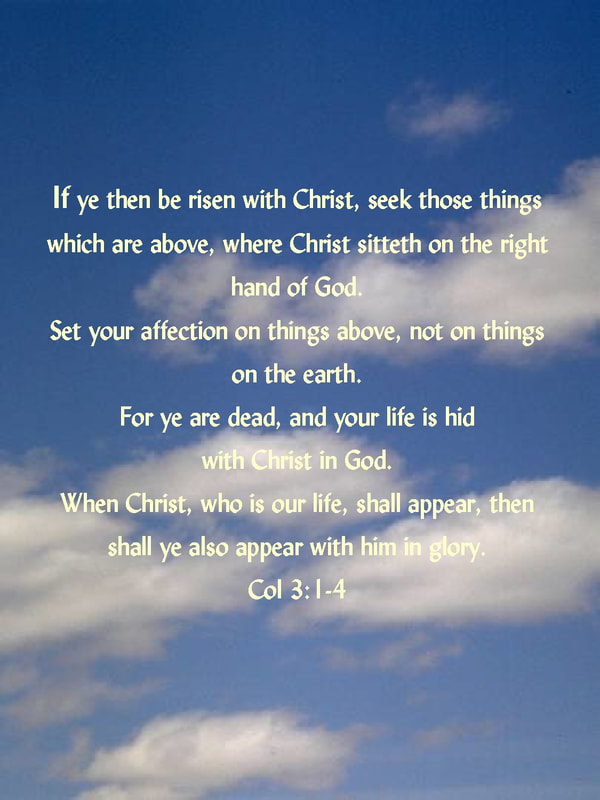Grace be with you. Amen." — Col 4:18
There are other bonds than iron chains which impose on us their restraints and limitations. Many of us, as we review our work at the close of the day, are overwhelmed with the sense of failure. As we kneel before our Lord, we are constrained to say, "Alas, we have inscribed Thy Name on the hearts which lay open to us, as paper the hand, in very clumsy and unworthy style. Forgive us, and remember our bonds."
Let us accept our limitations as from the Will of God. There is no way to peace or power, save in accepting the Will of God, making no distinction between what He appoints or permits, but believing that in either we are in contact with the Eternal purpose for us. Paul never forgot that he was the prisoner of Jesus Christ. He believed that for every limitation on the earthward side there would be enlargement on the other and spiritual side. Weakness here, added strength there; the being hourly delivered unto the cross, and from the ground the blossoming of endless life.
Let us do all the good we can in spite of fetters. St. Paul could not continue his travels over the world, but there were many avenues of service open to him. He could pray, and he did (Col_1:3; Col_2:1; Col_4:12). He could influence others (Php_1:11-14).
Php 1:11 Being filled with the fruits of righteousness, which are by Jesus Christ, unto the glory and praise of God.
The Advance of the Gospel
Php 1:12 But I would ye should understand, brethren, that the things which happened unto me have fallen out rather unto the furtherance of the gospel;
Php 1:13 So that my bonds in Christ are manifest in all the palace, and in all other places;
Php 1:14 And many of the brethren in the Lord, waxing confident by my bonds, are much more bold to speak the word without fear.
He employed his leisure in writing the epistles that have been the perennial solace of sorrowful hearts. There is a door, nearer to you than you think, opening out of your prison, through which God will enable you to render helpful service for Him. [Our Daily Walk]
How many chains there are that need to be remembered.
1. Temperament often hinders men from being and doing what others expect of them. Some are impulsive, others slow; some are irritable, others placid; some must work spasmodically, others are dogged; some are sanguine, others despondent. You see all this in the family circle, where you make allowance. You see it in the Church; remember it there.
2. The bondage of education, the training of a lifetime, leads to misunderstandings. One man has had a rough, and another a gentle, bringing up. They meet as brethren—the one hearty, the other reserved. The one thinks the other rude; the other thinks his brother cold. Yet both are equally friendly and loyal. What they want is to remember one another’s bonds.
3. Family ties are sometimes bonds. How many live in unsympathetic homes which restrain their better impulses, and act as a clog to their activities. How many have claims upon them of which others know nothing, and which make them appear frugal, to the point of being stingy.
4. What a chain, too, is some forgiven sin. It hinders men from taking positions which others in ignorance would thrust upon them. Just such a sin barred David from building the Temple. There is a sense in which we should forget a man’s past—in kindness; but there are times when we should remember it in love. It will thus account for much that is unaccountable.
How important it is that these bonds should be remembered. When a man is appointed to do some work in a public observatory, he is set to take some well-ascertained observations, that any deviation on his part from the average vision may be ascertained. And this deviation is called his “personal difference,” and is allowed for. If forgotten it would make his work useless. Something like this should be done by Christians. Allowance should be made for each man’s “personal difference.” Our brother’s chain should be remembered. [ J. Ogle - Excerpt from Biblical Illustrator]
2Ti 1:8 Be not thou therefore ashamed of the testimony of our Lord, nor of me his prisoner: but be thou partaker of the afflictions of the gospel according to the power of God;
2Ti 1:9 Who hath saved us, and called us with an holy calling, not according to our works, but according to his own purpose and grace, which was given us in Christ Jesus before the world began,
Heb 13:3 Remember them that are in bonds, as bound with them; and them which suffer adversity, as being yourselves also in the body.



















